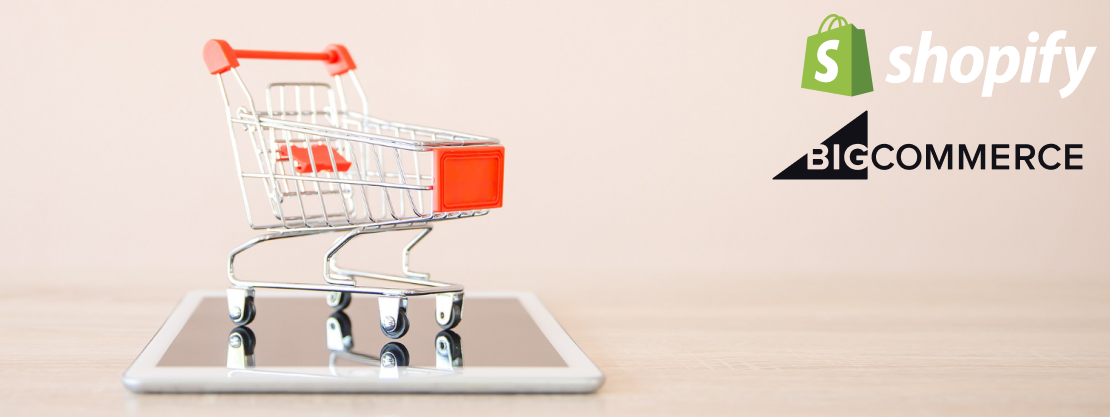
Choosing an eCommerce platform can be confusing. There are a lot of options, each promising to help you grow, simplify your store, or unlock new sales channels. But not every eCommerce platform fits every business. What works for one brand might not work for yours.
You’re not just picking software. You’re choosing the foundation of your online business. That decision affects how easily you can scale, what features you have access to, and how much control you have over your store.
Right now, two platforms lead the pack: Shopify and BigCommerce. Both are popular. Both are powerful. But they are built differently, and those differences matter.
This guide will walk you through how each one works, what they do well, where they fall short, and which types of businesses they’re best suited for. Whether you’re just starting out or getting ready to scale, this comparison will help you make the right call.
Big Picture: What Are Shopify and BigCommerce?
Shopify is a popular eCommerce platform designed for ease of use. It’s ideal for entrepreneurs who want to launch quickly with minimal technical effort. With a vast library of themes and apps, Shopify makes it easy to customize your shopify store and extend functionality as your business grows. It’s especially strong in direct-to-consumer selling and dropshipping.
BigCommerce is another leading eCommerce platform, built with scalability and flexibility in mind. It offers a wide range of features built directly into the platform like advanced SEO tools, multi-channel selling, and native B2B support, which can reduce the need for add-ons. That said, BigCommerce has an extensive app marketplace and supports integrations, giving businesses room to expand their capabilities as needed.
Both platforms support small businesses, but they scale in slightly different ways. Shopify emphasizes a plug-and-play ecosystem with a user-friendly interface, while BigCommerce provides more built-in tools upfront, which can be helpful for businesses with complex product catalogs or multi-channel strategies.
Shopify: Strengths, Weaknesses, and Best Fit

What Shopify Does Well
Shopify is known for its simplicity. The platform is clean, intuitive, and easy to learn, making it a go-to choice for entrepreneurs who want to launch fast without getting stuck in the tech. You don’t need to know how to code or hire a developer to get started.
Shopify also offers a massive ecosystem of themes, apps, and integrations. Whatever feature you need, from subscription billing to loyalty programs, there’s likely an app for it. This flexibility makes it ideal for businesses that want to grow and evolve over time.
It’s especially strong for direct-to-consumer brands and dropshipping stores. Many entrepreneurs use Shopify to test product ideas, grow a following, and scale quickly. For businesses that outgrow the standard plans, Shopify Plus offers enterprise-level tools and support for high-volume sellers.
Where Shopify Falls Short
Because Shopify relies so heavily on third-party apps, your monthly costs can add up quickly. Many essential features like advanced reporting, subscriptions, or B2B tools, require paid add-ons. What starts out affordable can become expensive as your store scales.
Shopify also has limitations for wholesale or B2B sellers. While there are workarounds, the eCommerce platform doesn’t offer advanced B2B website functionality out of the box, and customizing it for that purpose can require extra time and investment.
Finally, unless you use Shopify Payments, the eCommerce platform charges additional transaction fees, something to keep in mind if you prefer other payment gateways.
Who Shopify Is Best For
Shopify is a great fit for solo entrepreneurs, lifestyle brands, and fast-growing DTC businesses. If your focus is on selling directly to customers with a clean storefront and a flexible, app-driven setup, Shopify makes a lot of sense. It’s especially popular in industries like fashion, beauty, wellness, and niche consumer products. Custom Shopify development services can help you get the most out of the platform.
BigCommerce: Strengths, Weaknesses, and Best Fit

What BigCommerce Does Well
The BigCommerce platform gives you more features right out of the box. From multi-channel selling to advanced SEO and native B2B tools, you can launch with serious functionality already built in. That means less reliance on third-party apps and a smoother path to scale.
It’s built to handle complexity. Whether you’re selling across multiple channels, managing a large product catalog, or supporting both retail and wholesale buyers, BigCommerce scales with you. The platform is ideal for brands with long-term growth in mind.
BigCommerce also tends to offer a lower total cost of ownership at scale. Because many features are built-in, you may not need as many paid apps or workarounds, which helps control your costs as you grow.
Where BigCommerce Falls Short
BigCommerce has a bit more of a learning curve compared to Shopify. While it’s not difficult to use, its backend is more robust and feature-heavy, which means it can take a little more time to get comfortable with, especially if you’re new to eCommerce. That extra depth, however, gives growing businesses more room to scale without relying heavily on third-party apps.
It also has a smaller ecosystem of themes and apps. While it still supports customization and integrations, Shopify has a bigger marketplace overall.
Who BigCommerce Is Best For
BigCommerce is ideal for manufacturers, wholesalers, and businesses with complex catalogs or multi-channel strategies. It’s a strong fit for B2B companies and high-volume sellers who want control and built-in tools from day one. If you want help unlocking that potential, BigCommerce development services can guide your growth.
Shopify vs. BigCommerce: What Really Matters
Choosing a platform isn’t about which one is “better.” It’s about which one fits how you sell, how fast you’re growing, and how much control you want. Here’s how Shopify and BigCommerce stack up where it actually counts:
Ease of Use
Shopify is easier to get started with. It’s built for non-technical users. BigCommerce is still manageable, but it asks for a bit more upfront learning, and rewards you with more control.
Customization and Design
Shopify wins for plug-and-play themes and visual polish. BigCommerce gives you more flexibility under the hood, but you might need dev help for advanced tweaks.
Built-in Tools
BigCommerce bakes in more features from day one like advanced SEO, B2B pricing, and multi-channel sales. Shopify relies more on apps, which means more monthly costs and setup time.
Growth and Scale
Shopify grows through its app ecosystem and Shopify Plus. BigCommerce has more of what growing brands need already built in. Less app-juggling, more scaling straight from the dashboard.
Costs Over Time
Shopify can start cheaper but gets expensive with apps and add-ons. BigCommerce may cost more upfront but tends to have a lower total cost of ownership as you grow.
B2B and Wholesale
BigCommerce is made for it, native B2B tools, custom pricing, quote workflows. Shopify can do it, but only with third-party apps or custom development.
Community and Support
Shopify has the bigger community, more tutorials, agencies, and third-party tools. BigCommerce support is strong too, especially for larger or more complex stores.
Conclusion: Choose a Platform That Supports Your Growth
As your business grows, cracks in the wrong platform will start to show. What worked when you started might not hold up under the weight of new products, new markets, or a more complex customer base. Shopify and BigCommerce are both strong options, but each scales differently, and choosing the right one now can save you from costly headaches later.
Ask yourself: Where is your business headed? Will you need B2B support? Are you managing a growing SKU list? Do you need deeper control over workflows and multi-channel sales?
This decision isn’t just about where you are today. It’s about setting yourself up to grow with confidence.
If you’re unsure which platform fits your next stage, talk to the experts at MAKDigital. We’ve helped businesses scale smart, whether that means pushing Shopify further or migrating to BigCommerce for long-term strength. Contact us to make sure your foundation can handle what’s next.

 Eashan Mehta
Eashan Mehta





